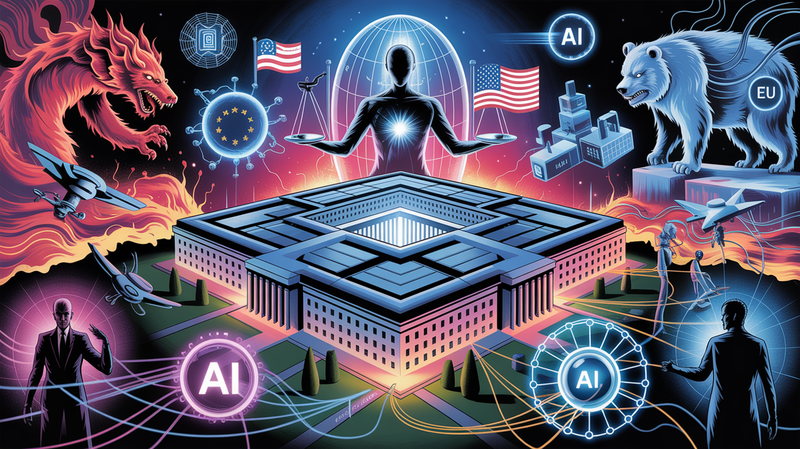Navigating the New Frontier: The Rise of 'Supermind' and Its Implications for Global Tech Dominance
In an era where technological innovation is at the forefront of global power dynamics, a groundbreaking development has emerged from China, potentially reshaping the future of international technology and research. The project, known as "Supermind," represents a significant leap in artificial intelligence (AI) applications, highlighting China's
In an era where technological innovation is at the forefront of global power dynamics, a groundbreaking development has emerged from China, potentially reshaping the future of international technology and research. The project, known as "Supermind," represents a significant leap in artificial intelligence (AI) applications, highlighting China's ambitious strategy to assert its dominance in the global technology race. This strategic move not only underscores the intensifying competition between China and the United States but also raises profound questions about the ethical, security, and geopolitical implications of leveraging AI at such a scale.
The Genesis of Supermind
Situated in Shenzhen, China's southern technology hub renowned for being the cradle of tech giants like Huawei and Tencent, Supermind is the centerpiece of a broader initiative to harness AI for state-driven objectives. Funded primarily by the Shenzhen government, with an investment of $280 million, the project aims to develop an AI-based intelligence platform capable of tracking and cataloging the activities and breakthroughs of millions of scientists and researchers worldwide.
Supermind's goal is ambitious: to create an exhaustive database encompassing 300 million global science and technology research papers, 120 million patents, and detailed profiles of 130 million global scholars. This endeavor is not merely about data accumulation; it's about scrutinizing work in unparalleled detail to identify and potentially recruit top talents, thereby securing China's foothold in critical technological areas such as AI, quantum computing, and semiconductors.
Strategic Implications and Global Reactions
The unveiling of Supermind has sent ripples through the geopolitical landscape, highlighting the strategic competition for technological supremacy between China and the United States. This competition is not new; however, the scale and sophistication of Supermind bring a new dimension to the rivalry. It signifies a shift from traditional forms of espionage and talent acquisition to a more systematic and technologically driven approach, raising concerns about data privacy, intellectual property rights, and the potential for a global talent drain towards China.
Western reactions to Supermind have been mixed, with admiration for its technological ambition tempered by apprehension over its implications for global tech leadership and security. The project is emblematic of China's broader efforts to limit foreign access to its scientific databases, aligning with recent data and counterespionage laws designed to safeguard its technological advancements. These developments have prompted responses from the U.S., including restrictions on Chinese tech companies and heightened scrutiny of Chinese investments in American technology firms.
Ethical and Security Concerns
Beyond the strategic competition, Supermind raises significant ethical and security questions. The platform's ability to track and analyze the work of millions of researchers worldwide poses profound privacy concerns, highlighting the potential for abuse in the absence of stringent ethical guidelines and oversight. Furthermore, the project's focus on recruiting international talent underscores the need for a balanced approach to global knowledge exchange, one that respects individual rights and fosters collaboration rather than coercion.
The security implications of Supermind are equally concerning. The accumulation of vast amounts of scientific and technological data by a state-sponsored platform can potentially lead to the exploitation of research findings for military or strategic purposes, complicating international efforts to maintain peace and stability. These concerns are exacerbated by the opacity surrounding the project's operations and objectives, as well as China's recent actions to restrict access to its own scientific databases, thereby limiting reciprocal transparency.
The Path Forward
As the world navigates the implications of China's Supermind project, it is clear that the future of global technology leadership will increasingly depend on the ability to innovate in AI and related fields. This reality necessitates a comprehensive international dialogue on the ethical, security, and governance challenges posed by state-sponsored AI initiatives. Balancing the pursuit of technological advancement with respect for privacy, intellectual property rights, and global stability will be paramount.
Moreover, the international community must consider mechanisms to ensure that the benefits of AI and other emerging technologies are shared equitably, fostering a spirit of collaboration rather than competition. Establishing global norms and agreements on the use of AI in research and talent acquisition could help mitigate potential conflicts and ensure that the technological future is built on a foundation of mutual respect and understanding.
In conclusion, Supermind represents a pivotal moment in the global tech race, one that highlights the transformative potential of AI while also underscoring the challenges and responsibilities that come with it. As China and the United States continue their competition for technological supremacy, the world must navigate this new frontier with caution, ensuring that the pursuit of innovation serves the greater good and promotes a stable, equitable technological future.





